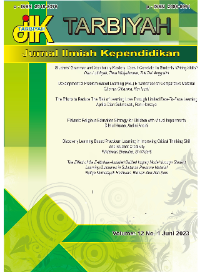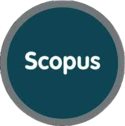Project-Based Learning in Analytic Geometry Courses to Support Student’s Mathematic Communication Skill
DOI:
https://doi.org/10.18592/tarbiyah.v12i2.9784Keywords:
analytic geometry, communication, mathematical, project based learningAbstract
This research aims to design project-based learning in analytical geometry learning to develop students' mathematical communication skills. This research is motivated by the reluctance of the majority of students to express their opinions during class learning. Project-based learning was chosen because it has process-centered, problem-focused characteristics, integrating the concepts of several components of knowledge, disciplines, and field experience. Some exciting learning video designs on parabolas, ellipses, and hyperbolas were found in the findings of this project. Definitions, methods for analytically characterizing parabolas, ellipses, and hyperbolas, as well as example problems and exercises, are all included in the learning videos. The video showed that students could audio-visually express mathematical ideas about conic slices, presenting in algebraic form or using mathematical symbols. Through this project assignment, students can also develop their digital literacy skills.References
Allen, C. E., Froustet, M. E., LeBlanc, J. F., Payne, J. N., Priest, A., Reed, J. F., Worth, J. E., Thomason, G. M., Robinson, B., & Payne, J. N. (2020). National Council of Teachers of Mathematics. The Arithmetic Teacher, 29(5), 59. https://doi.org/10.5951/at.29.5.0059
Anggraini, P. D., & Wulandari, S. S. (2020). Analisis Penggunaan Model Pembelajaran Project Based Learning Dalam Peningkatan Keaktifan Siswa. Jurnal Pendidikan Administrasi Perkantoran (JPAP), 9(2), 292–299. https://doi.org/10.26740/jpap.v9n2.p292-299
Bassey, M. (2000). Case Study Research in Education Settings. Http://Lst-Iiep.Iiep-Unesco.Org/Cgi-Bin/Wwwi32.Exe/[In=epidoc1.in]/?T2000=012102/(100).
Chasanah, C., Riyadi, & Usodo, B. (2020). The effectiveness of learning models on written mathematical communication skills viewed from students’ cognitive styles. European Journal of Educational Research, 9(3), 979–994. https://doi.org/10.12973/EU-JER.9.3.979
Chhetri, A. (2011). Case Study Research In Educational Settings Related papers.
Creswell, J. W. (2012). Educational research: Planning, conducting, and evaluating quantitative and qualitative research. Pearson Education, Inc.
Deswita, R., & Kusumah, Y. S. (2018). Peningkatan Kemampuan Komunikasi Matematis Siswa Melalui Model Pembelajaran CORE dengan Pendekatan Scientific. Edumatika : Jurnal Riset Pendidikan Matematika, 1(1), 35. https://doi.org/10.32939/ejrpm.v1i1.220
Firman, M., Saputra, A., Isnarto, I., & Hartono, H. (2022). Unnes Journal of Mathematics Education Research Students ’ Mathematical Communication Skills based on AQ in Discovery Learning Model with Realistic Approach. 2, 220–231.
Graham, K. J., & Fennell, F. (2001). Principles and standards for school mathematics and teacher education: Preparing and empowering teachers. School Science and Mathematics, 101(6), 319–327.
Hanisah, H., & Noordyana, M. A. (2022). Kemampuan Komunikasi Matematis Siswa pada Materi Penyajian Data di Desa Bojong. Plusminus: Jurnal Pendidikan Matematika, 2(1), 131–140. https://doi.org/10.31980/plusminus.v2i1.1588
Hariati, M. E., Sinaga, B., & Mukhtar, M. (2022). Analisis Kesulitan Komunikasi Matematis Siswa Dalam Penerapan Model Pembelajaran Think Pair Share. Jurnal Cendekia : Jurnal Pendidikan Matematika, 6(1), 702–709. https://doi.org/10.31004/cendekia.v6i1.1228
Lestari, K. E., & Yudhanegara, M. R. (2015). Penelitian pendidikan matematika. Bandung: PT Refika Aditama, 2(3).
Masruroh, Nawafilah, N. Q., & Anggraini, E. (2022). The Analysis of students ’ school burnout level and academic achievement on the science management subject. Tarbiyah: Jurnal Ilmiah Kependidikan, 11(2), 49–57.
Mughrabi, N. (2021). Exploring Project-Based Learning Practices to Foster Students’ Motivation.
Nashihah, U. H. (2020). Membangun Kemampuan Komunikasi Matematis Siswa dengan Pendekatan Saintifik: Sebuah Perspektif. Jurnal Pendidikan Matematika (Kudus), 3(2), 201. https://doi.org/10.21043/jmtk.v3i2.7193
Niss, M., & Højgaard, T. (2019). Mathematical competencies revisited. Educational Studies in Mathematics, 102, 9–28.
Noviarsyh Dasaprawira, M., Zulkardi, & Susanti, E. (2019). Developing mathematics questions of Pisa type using Bangka context. Journal on Mathematics Education, 10(2), 303–314. https://doi.org/10.22342/jme.10.2.5366.303-314
Rusdi. (2019). The importance of speaking skills in English classrooms. Alford Council of International English & Literature Journal, 2(2), 6–18. www.acielj.com
Santoso, P. (2017). Penggunaan model pembelajaran project based learning (pbl) sebagai upaya peningkatan hasil belajar ekonomi. Prosiding Seminar Pendidikan Ekonomi Dan Bisnis UNS, 3(1), 1–7.
Setiyani, Putri, D. P., Ferdianto, F., & Fauji, S. H. (2020). Designing a digital teaching module based on mathematical communication in relation and function. Journal on Mathematics Education, 11(2), 223–236. https://doi.org/10.22342/jme.11.2.7320.223-236
Shin, M.-H. (2018). Effects of project-based learning on students’ motivation and self-efficacy. English Teaching, 73(1), 95–115. https://doi.org/10.15858/engtea.73.1.201803.95
Sudarsana, I. K., Mulyaningsih, I., Kurniasih, N., Haimah, Wulandari, Y. O., Ramon, H., Satria, E., Saddhono, K., Nasution, F., & Abdullah, D. (2019). Integrating Technology and Media in Learning Process. Journal of Physics: Conference Series, 1363(1). https://doi.org/10.1088/1742-6596/1363/1/012060
Sumaji, Sa’Dijah, C., Susiswo, & Sisworo. (2019). Students’ problem in communicating mathematical problem solving of Geometry. IOP Conference Series: Earth and Environmental Science, 243(1). https://doi.org/10.1088/1755-1315/243/1/012128
Tambunan, H. (2019). The Effectiveness of the Problem Solving Strategy and the Scientific Approach to Students’ Mathematical Capabilities in High Order Thinking Skills. International Electronic Journal of Mathematics Education, 14(2), 293–302. https://doi.org/10.29333/iejme/5715
Tinungki, G. M. (2015). The Role of Cooperative Learning Type Team Assisted Individualization to Improve the Students’ Mathematics Communication Ability in the Subject of Probability Theory. Proc.of the Fifth Conference for the Psychology of Mathematics Education, 6(32), 27–31. https://eric.ed.gov/?id=EJ1083611
Widjayanti, D. B. W. (2010). Mengembangkan Kemampuan Komunikasi Matematis Mahasiswa Calon Guru Matematika Melalui Strategi Perkuliahan Kolaboratif Berbasis Masalah. 1–13.
Wulandari, Y. O., Khasanah, F., & Octavianti, C. T. (2022). Project-based learning as an alternative solution for learning computer basics during the Covid-19 pandemic. International Journal for Educational and Vocational Studies, 4(2), 125. https://doi.org/10.29103/ijevs.v0i0.5645
Yuniarti, Y. (2016). Pengembangan Kemampuan Komunikasi Matematis dalam Pembelajaran Matematika di Sekolah Dasar. EduHumaniora | Jurnal Pendidikan Dasar Kampus Cibiru, 6(2), 109–114. https://doi.org/10.17509/eh.v6i2.4575
Downloads
Published
How to Cite
Issue
Section
License
Copyright (c) 2023 Yunita Oktavia Wulandari

This work is licensed under a Creative Commons Attribution 4.0 International License.
Authors retain copyright and grant the journal right of first publication with the work simultaneously licensed under a Creative Commons Attribution 4.0 International License that allows others to share the work with an acknowledgment of the work's authorship and initial publication in this journal.




